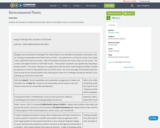
A lesson for learners to understand and take action on the plastic issue in our envrionments.
- Subject:
- Environmental Science
- Material Type:
- Lesson Plan
- Author:
- Thomas Larkin
- Date Added:
- 08/13/2021

A lesson for learners to understand and take action on the plastic issue in our envrionments.
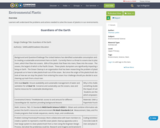
Learners will understand the problems and actions needed to solve the issues of plastics in our environments.
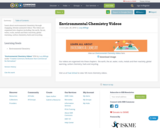
Learn about environmental chemistry through engaging, bitesize animated videos. The videos are organised into chapters including: the earth, the air, water, rocks, metals and their reactivity, global warming, carbon chemistry, fuels and recycling.
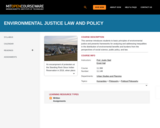
This seminar introduces students to basic principles of environmental justice and presents frameworks for analyzing and addressing inequalities in the distribution of environmental benefits and burdens from the perspectives of social science, public policy, and law.
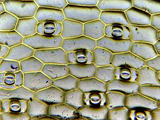
OER Fundamentals are invited to remix this course planning template to design and share their OER project plans, course information and syllabus, and reflection.
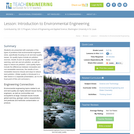
Students are presented with examples of the types of problems that environmental engineers solve, specifically focusing on air and land quality issues. Air quality topics include air pollution sources, results of poor air quality including global warming, acid rain and air pollution, as well as ways to reduce air pollution. Land quality topics include the differences between renewable and non-renewable resources, the results of non-renewable resource misuse and ways to reduce land pollution. (Water quality is introduced in a later lesson in a separate presentation, as it is the focal point of this unit curriculum.)

This lesson introduces students to the nature of science and how to evaluate evidence to determine whether they are engaging in science or pseudoscience.

The pupil remembers about biodiversity. The pupil develops an understanding of the diversity in animal. The pupil applies his or her knowledge and understanding of the concept biodiversity. The pupil analyses the living thing and non living thing.

Environmental protection is a prerequisite for survival on this planet. This Mini Lecture explores questions of sustainability, environment, energy supply and peace. Lecture snippets of Nobel Laureates Willy Brandt, Frank Sherwood Rowland und Paul Crutzen are presented, who address these issues in their research.

Overview;Apply technological and writing skills to create a brochure on ways to preserve and protect Belize’s Natural Environment.Creatively develop a brochure in English listing steps a family can implement to reduce pollution in living environment (Democracia and Mahogany Heights) area.
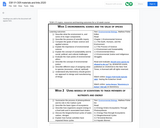
Environmental Biology, by Matthew R. Fisher, Editor, and supplemental resources specific to the Pacific Northwest. See https://openoregon.pressbooks.pub/envirobiology/
Course Description
Covers environmental topics that are primarily biological in nature. Includes human population issues, matter and energy resources, ecosystems, environmental ethics, and food and land resources. The associated laboratories will illustrate these topics and may include fieldwork.
Upon completion of the course students should be able to:
Express graphically, orally or in writing, basic elements and functions of ecosystems.
Identify and express interactions of humans and the environment.
Utilize field and laboratory methods and technologies to measure and describe ecosystems.
Demonstrate an understanding of ecosystem functioning and human effects upon ecosystems.

Sentence Overview;Apply technological and writing skills to create a brochure on ways to preserve and protect Belize’s Natural Environment.Creatively develop a brochure in English listing steps a family can implement to reduce pollution in living environment (Democracia and Mahogany Heights) area.
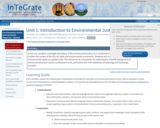
In this unit, students investigate the history of the environmental justice (EJ) movement in the United States, situating it within the context of the US civil rights and environmental movements. Students also make connections to issues of environmental equity on a global scale. The unit serves as a foundation for exploring the scientific background of environmental justice issues in subsequent units, particularly the interrelatedness of hydrology and hydrologic concepts.
(Note: this resource was added to OER Commons as part of a batch upload of over 2,200 records. If you notice an issue with the quality of the metadata, please let us know by using the 'report' button and we will flag it for consideration.)
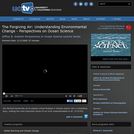
Join Richard Somerville as he weaves critical findings in climate science into a compelling story, making the most important issues of our time understandable to all. (57 minutes)

This class explores the foundations of environmental justice theory and how they apply to historical, current, and emerging global issues. The goal of the course is to explore theories of distributive, procedural, and recognition justice as they relate to environmental ‘goods’ and ‘bads.’ We will explore a variety of case studies, touching on interrelated topics ranging from climate justice, food justice, energy justice, water justice, etc. This course blends sociological perspectives with natural resource management and policy implication
Learning Objectives:
Develop a critical understanding of the historical development of the theory and practice of environmental justice.
Gain familiarity with key thinkers, theories, and debates in the field.
Be able to identify social, economic, and political factors that contribute to the existence of disparities in environmental outcomes.
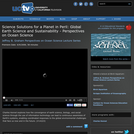
Charles Kennel explores how the convergence of earth science, biology, and social science through the use of information technology can lead to continuous awareness of Earth's systems, enabling coordinated responses to the global environmental challenges that face us now and in the future. (58 minutes)

In this upper-grades activity, students use basic news reporting skills to explore the impact of environmental racism.
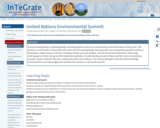
Environmental geology is applied geology and being applied requires an understanding of all of the pieces of the puzzle. This activity is a culmination of many ideas learned in environmental geology: discussing the issue of population growth as well as a driving force, plate tectonics, behind a changing climate and many hazards, and then the hazards themselves, discussing anthropogenic climate change and the implications globally. An understanding of each of these and their interconnectedness provides a great context for decision-making and earth science literacy. This activity attempts to take all of the knowledge mentioned here and make judgements and decisions based on a real-world scenario
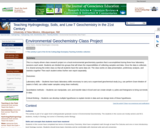
This is a inquiry-driven class research project on a local environmental geochemistry question that is accomplished during three-hour laboratory sessions each week. Students are divided into groups that will share the responsibilities of collecting samples and data. Once the data is collected, it is shared among the entire class so that all students have the same data set. The class works on data presentation, preliminary analysis, and statistics together Then each student writes his/her own report separately.
Outcomes:
Laboratory skills -- Students have basic laboratory skills necessary to carry out a supervised geochemical study (e.g. can perform Gram titration of waters in field, can collect water samples using clean methods).
Quantitative methods -- Students can manipulate, sort, and transfer data in Excel and can create simple x-y plots and histograms to bring out trends in data.
Critical thinking -- Students can develop multiple hypotheses to explain trends in data and can design tests of these hypotheses.
(Note: this resource was added to OER Commons as part of a batch upload of over 2,200 records. If you notice an issue with the quality of the metadata, please let us know by using the 'report' button and we will flag it for consideration.)

This class provides a general introduction to the diverse roles of microorganisms in natural and artificial environments. It will cover topics including: cellular architecture, energetics, and growth; evolution and gene flow; population and community dynamics; water and soil microbiology; biogeochemical cycling; and microorganisms in biodeterioration and bioremediation.